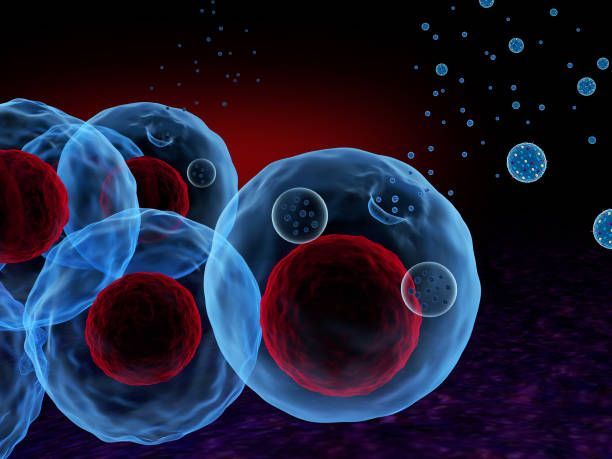EXOSOME therapy
unparalleled wellness solutions that go beyond mere symptom relief, focusing on total body rejuvenation

Exosomes are small vesicles, or tiny membrane-bound sacs, that play a crucial role in cell communication.
These nanoscale particles are involved in transporting information between cells, and they have garnered significant attention in the field of regenerative medicine.
The role of exosomes in regenerative medicine is continually evolving, and they hold great promise for future therapies and treatments.
Here's what you need to know:
Click to Expand menus
-
Cellular Messengers
Exosomes act as messengers between cells, carrying important cargo such as proteins, nucleic acids, and lipids.
This cargo can influence the behavior of recipient cells.
-
Regenerative Potential
Exosomes derived from stem cells, including Mesenchymal Stem Cells (MSCs), have regenerative properties.
They can stimulate tissue repair, reduce inflammation, and enhance cellular regeneration.
-
Disease Applications
Research into exosomes has expanded into various disease areas, including neurodegenerative disorders, cardiovascular diseases, and cancer.
Exosome-based therapies are being explored in these contexts.
-
Diagnostic Tools
Exosomes are also studied for their potential as diagnostic tools.
They can be isolated from bodily fluids like blood or urine and may contain markers indicative of disease.
Exosomes are indeed small vesicles, typically ranging in size from 30 to 150 nanometers. As tiny membrane-bound sacs, they are released from virtually all cell types and play a pivotal role in cell-to-cell communication. This communication is facilitated through the transfer of proteins, lipids, RNA, and DNA contained within the exosomes, allowing them to transport crucial biological information between cells.
In the field of regenerative medicine, exosomes have garnered significant attention due to their potential in facilitating tissue repair and regeneration. Unlike cells, exosomes are not prone to initiating an immune response, making them a promising avenue for therapeutic applications. Their ability to modulate the environment of recipient cells is particularly important in processes like wound healing, tissue regeneration, and even in modulating immune responses.
One of the key advantages of exosomes in regenerative medicine is their role in transferring growth factors, cytokines, and genetic materials to target cells. This transfer can stimulate various cellular processes, including angiogenesis (formation of new blood vessels), cell differentiation, and the repair of damaged tissues. For instance, exosomes derived from stem cells have shown potential in enhancing the regenerative process in damaged tissues, such as in cases of heart or liver injuries.
Moreover, exosomes are being explored as a means of drug delivery. Due to their small size and compatibility with human cells, they can potentially be loaded with drugs, proteins, or RNA molecules to target specific cells or tissues, offering a more targeted and less invasive treatment option compared to conventional therapies.
Research into exosomes is also revealing their potential in diagnostics. Since they carry molecular information about their cell of origin, exosomes in bodily fluids like blood or urine could be used as biomarkers for diagnosing diseases, including cancer and neurodegenerative disorders.
In summary, exosomes represent a frontier in regenerative medicine and therapeutic strategies, offering promising possibilities in tissue repair, drug delivery, and disease diagnosis. Their unique properties and roles in cellular communication and material transfer make them a focus of intense research, with the potential to revolutionize aspects of medical treatment and diagnostics.
combining stem cells and exosomes
A powerful synergy that offers a multitude of benefits in the realm of regenerative medicine
-
Enhanced Regeneration
Stem cells possess the remarkable ability to transform into various cell types, promoting tissue repair and rejuvenation. Exosomes, on the other hand, act as messengers, directing and amplifying the regenerative efforts of stem cells. Together, they create a highly effective regenerative team, accelerating healing and tissue renewal.
-
Reduced Inflammation
Exosomes are known for their anti-inflammatory properties, helping to mitigate chronic inflammation in the body. This reduction in inflammation is essential for a wide range of conditions, from orthopedic issues to autoimmune diseases, contributing to overall well-being.
-
Combining Them
Using exosomes alongside stem cell therapy can reduce the risk of immune system rejection. Exosomes act as a "stealth mode" for stem cells, ensuring their therapeutic potential is harnessed without unwanted immune system interference.
-
Personalized Healing
The combination of stem cells and exosomes allows for a more personalized approach to regenerative therapy. By tailoring treatments to individual needs, the potential for optimal outcomes is significantly increased.
-
Accelerated Recovery
Whether you're recovering from an injury, surgery, or simply seeking to rejuvenate your body, the partnership of stem cells and exosomes can expedite the healing process, helping you return to your best self more quickly.
regeneration blogs

THERAPIES:
Timeless Group:
Timeless Lifespan & Timeless Beauty
Av. Balamkanche, Plaza Xaman Ha
Playa Del Carmen, Quintana Roo
| Clinical Trials | FAQs | Blogs |
Timeless Lifespan by Timeless Beauty | All Rights Reserved | Privacy Policies | Medical Disclaimer




